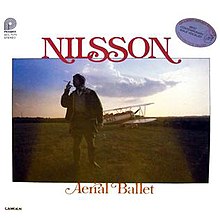Aerial Ballet
This article needs additional citations for verification. (March 2014) |
| Aerial Ballet | ||||
|---|---|---|---|---|
| File:Aerial Ballet.png | ||||
| Studio album by | ||||
| Released | July 1968 | |||
| Recorded | Late 1967–early 1968 | |||
| Genre | Pop | |||
| Length | 25:15 | |||
| Label | RCA Victor | |||
| Producer | Rick Jarrard | |||
| Nilsson chronology | ||||
| ||||
| Singles from Aerial Ballet | ||||
| ||||
| 1980 Pickwick reissue cover | ||||
 | ||||
| Review scores | |
|---|---|
| Source | Rating |
| AllMusic | |
| The Essential Rock Discography | 6/10[2] |
| Rolling Stone | (mixed)[3] |
Aerial Ballet is the third album by Harry Nilsson released in 1968.
Aerial Ballet was Nilsson's second album for RCA Victor, and was titled after the highwire circus act of his grandparents. It consists almost entirely of songs written by him, including "One", which later became a Number Five hit for Three Dog Night. (The song's opening line, "One is the loneliest number", is a common phrase to this day.) The title of the album has been given by Joey Kramer as the inspiration for Aerosmith's name and wings motif.[4]
The most familiar track from Aerial Ballet is its one cover song, Fred Neil's "Everybody's Talkin'". It was released as a single in North America in 1968, and reached the top forty in Canada—but initially flopped in the US. However, the song was subsequently selected for use in the Oscar-winning film Midnight Cowboy and became one of Nilsson's biggest hits as a performer, hitting the US top ten in 1969. Another song, "Little Cowboy", later featured in The Courtship of Eddie's Father, was written by Nilsson's mother.
The original opening number for Aerial Ballet was "Daddy's Song", but this track was removed (apparently without Nilsson's awareness) after the first copies were issued, because The Monkees had recorded a cover version to be featured in their film Head, and had paid $35,000 for exclusive rights to the song. The CD reissue restores "Daddy's Song" (with the Monkees' contract long expired) to its rightful place in the lineup.
When Nilsson visited the Beatles in London during 1968, John Lennon played Nilsson "Revolution" and selections from the (then-upcoming) 'White Album', and Nilsson, in turn, played to Lennon (who had spent thirty-six hours listening to Nilsson's previous album, Pandemonium Shadow Show) a demo cut of this record.
The album was reissued in 1980 on Pickwick (ACL-7075). It had a different cover featuring a biplane in a field, with the pilot standing in the foreground smoking a cigarette in a holder. It had a printed stamp in the upper right corner announcing "Grammy Award Winner, Best Contemporary Male Vocalist, Everybody's Talkin'". The song order was different, and the final song "Bath" was missing.
Track listing
All tracks are written by Harry Nilsson, except where noted
| No. | Title | Length |
|---|---|---|
| 1. | "Daddy's Song" | 2:19 |
| 2. | "Good Old Desk" | 2:22 |
| 3. | "Don't Leave Me" | 2:18 |
| 4. | "Mr. Richland's Favorite Song" | 2:12 |
| 5. | "Little Cowboy" | 1:22 |
| 6. | "Together" | 2:08 |
| No. | Title | Writer(s) | Length |
|---|---|---|---|
| 7. | "Everybody's Talkin'" | Fred Neil | 2:41 |
| 8. | "I Said Goodbye to Me" | 2:13 | |
| 9. | "Little Cowboy" | 0:52 | |
| 10. | "Mr. Tinker" | 2:41 | |
| 11. | "One" | 2:50 | |
| 12. | "The Wailing of the Willow" | Harry Nilsson, Ian Freebairn-Smith | 1:57 |
| 13. | "Bath" | 1:44 |
| No. | Title | Length |
|---|---|---|
| 14. | "Sister Marie" | 3:01 |
| 15. | "Miss Butter's Lament" | 2:20 |
| 16. | "Girlfriend" | 1:50 |
References
- ^ Stephen Thomas Erlewine. "Aerial Ballet – Harry Nilsson | Songs, Reviews, Credits, Awards". AllMusic. Retrieved 2014-03-25.
- ^ Strong, Martin C. (2006). The Essential Rock Discography. Edinburgh, UK: Canongate. p. 758. ISBN 978-1-84195-827-9.
- ^ Hansen, Barret (14 September 1968). "Records". Rolling Stone. San Francisco: Rolling Stone.
- ^ "Interview with Steven Tyler". AeroNewsDaily. March 13, 2008. Archived from the original on May 14, 2008. Retrieved August 22, 2016.
{{cite web}}: Unknown parameter|deadurl=ignored (|url-status=suggested) (help)
